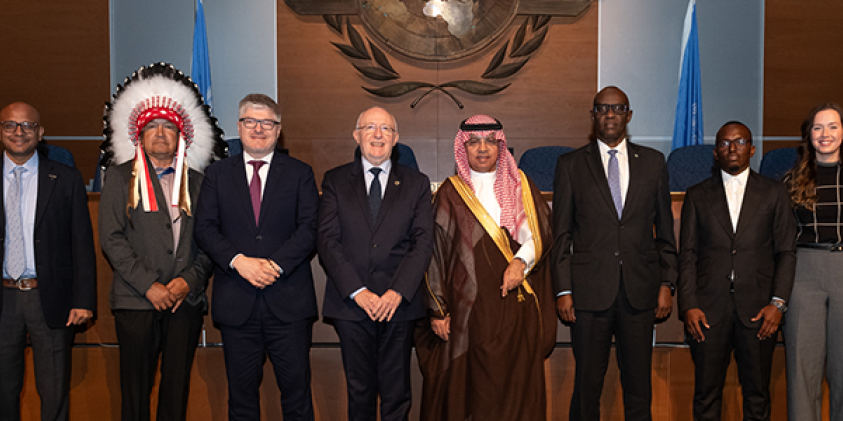ICAO Symposium delegates urge international community to act on fostering the deployment of advanced air mobility

Montréal, 10 September 2024 – A global Call to Action for the accelerated, safe, and sustainable deployment of Advanced Air Mobility (AAM) technologies emerged at the International Civil Aviation Organization (ICAO), at its first ever event wholly dedicated to the topic.
Themed “Advanced air mobility (AAM) global harmonization and interoperability: Challenges and opportunities," the symposium has brought together 400 high-level government officials from 75 countries and representatives of the United Nations system and international aviation industry associations. World-leading manufacturers, operators and other cutting-edge innovators also participated to inform the development of a global vision and to share best practices and challenges.
AAM comprises electric vertical take-off and landing (eVTOL) aircraft, unmanned aircraft systems (UAS) including drones, and a wide range of other technologies related to remotely piloted and autonomous aircraft.
“Advanced air mobility will revolutionize the transportation of passengers, goods, and services by reimagining aerial mobility in urban and regional contexts. However, realizing this vision requires careful consideration and planning at a global level, as we navigate the complex interplay of technology, infrastructure, regulation, and societal needs,” remarked ICAO Council President Salvatore Sciacchitano.
“The complexity of this undertaking is immense, necessitating insights from both core aviation stakeholders and new entrants,” he added. “This points to an essential role for ICAO in ensuring alignment around safety and sustainability in this rapidly evolving and expanding landscape.”
ICAO’s 2024 AAM event was officially opened by Mr. Sciacchitano, joined by His Excellency Abdulaziz Bin Abdullah Al Duailej, President of the General Authority of Civil Aviation (GACA) of the Kingdom of Saudi Arabia and His Excellency Prosper Higiro, High Commissioner of the Republic of Rwanda to Canada and Representative to ICAO.
ICAO is encouraging the deployment of these technologies to heighten aviation’s ability to act as a catalyst for sustainable development worldwide. AAM is bringing new and innovative capabilities through an increasing array of activities, including health care, agriculture, water supply and monitoring, wildfire control, passenger, mail and cargo transportation.
Furthermore, AAM holds the promise of accelerated development in many emerging economies, potentially allowing them to bypass traditional infrastructure limitations.
It is in this context that a Call to Action has emerged.
“Through our concerted efforts, we will embrace the numerous opportunities that AAM offers, shaping a future of aviation that is more accessible, efficient, and sustainable,” said ICAO Secretary General Juan Carlos Salazar.
Noting that the Call comprises specific priorities on regulatory interoperability and adaptability, airspace integration, multilevel cooperation and support for innovation, Secretary General Salazar emphasized the far-reaching implications of these initiatives. “AAM has considerable impact across various areas and disciplines throughout the aviation system” he said. “We therefore need to have a holistic approach to AAM and prepare for its convergence with conventional aviation.”
The Call urges cooperation among the wide array of stakeholders involved in AAM, including all levels of public authority; operators, manufacturers and service providers across the entire aviation ecosystem; private, public, and academic innovators; and other UN entities.
Indeed, several UN system entities today supported cooperation with ICAO, aimed at enhancing support for humanitarian missions by harmonizing UAS frameworks. This cooperation is essential, as UAS has proven invaluable to high-impact UN field operations, in areas like aid delivery, disaster response and peacekeeping operations.
The symposium will continue until 12 September, with delegates making important contributions to progress on these topics.
Resources for Editors
Au sujet de l'OACI
A specialized agency of the United Nations, the International Civil Aviation Organization (ICAO) leads the international alignment of technical standards and strategies, facilitating the safe, secure, and sustainable development of its 193 member states’ aviation sectors and air services. This year, ICAO is celebrating the 80th anniversary of its establishment by the 1944 Convention on International Civil Aviation.
UN support for AAM
The UN entities collaborating with ICAO are:
the United Nations Secretariat;
the World Food Programme;
UN Habitat;
the United Nations University;
the Universal Postal Union;
the United Nations Office on Drugs and Crime;
the Food and Agriculture Organization of the United Nations;
United Nations High Commissioner for Refugees;
and the International Telecommunication Union.
General Contact: communications [at] icao.int (communications[at]icao[dot]int)
Twitter: @ICAOMedia Contact: William Raillant-Clark, Administrateur des communications
wraillantclark [at] icao.int (wraillantclark[at]icao[dot]int)
+1 514-954-6705
+1 514-409-0705 (mobile)
Twitter: @wraillantclark
LinkedIn: linkedin.com/in/raillantclark/